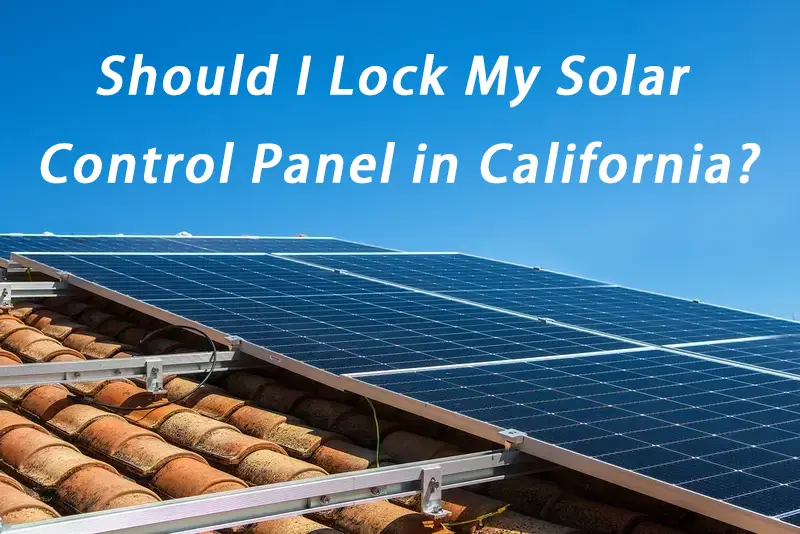The Big Question: Lock It or Leave It?
If you're a California homeowner with solar, chances are you've asked yourself: Should I lock my solar control panel? It sounds reasonable, right—solar is a pricey investment, and nobody wants vandals or curious fingers messing around with a system that powers their home. But here's the problem: locking your control panel can ultimately do more harm than good.
Why? Because in a crisis—like a fire or electrical failure—first responders must be able to access that panel immediately. If it's locked, they're in trouble waiting, and waiting could result in massive damage or injury. California safety codes actually encourage access to the emergency shut-off switch, not barriers.
So is that saying never lock it? Not exactly. Like everything in California, it depends.
Why Solar Control Panels are Such a Hot Topic in California
- High adoption levels: California leads the rooftop solar installations. The greater number of panels, the greater the number of target sites.
- High power costs: As the utility bills escalate, solar systems are more valuable than ever.
- Code compliance everywhere: From the CPUC (California Public Utilities Commission) to local fire codes, there are rules about access, safety, and system design.
Your control panel is the hub of your system—it's the "ignition key" for your solar array. If it's compromised, so is the rest of the system.
The Case Against Locking
Don't run out to the hardware store just yet. Here are the most important reasons that experts often advise against locking home solar control panels:
- Emergency Access
Firefighters and electricians may need to shut down your system in a few minutes. A lock may take valuable minutes. - OSHA and Safety Codes
OSHA rules applicable to locked panels mainly control commercial or industrial sites, where access is restricted to trained personnel. Homeowners apply the rule of thumb: convenience. - Vandalism Is Rare
In California suburbs and cities in general, cases of people messing with solar panels or control boxes are rare. The bigger theft problem seems to happen in remote solar farms, not home installations.
When Locking Is Advisable
But there are circumstances where you would consider it—warily:
- High Vandalism Areas
If you live in a rural or high-crime area where outdoor electrical boxes were easy marks in the old days, a lock could give you peace of mind. - Commercial Installations
On large industrial or commercial solar installations, OSHA occasionally requires locked panels to keep untrained staff out. That's a whole other ball game.
But for homeowners, any locking mechanism must still comply with fire codes and allow quick access in emergencies.
Smarter Alternatives to Padlocks
If you’re worried about theft or tampering, here are safer (and more code-friendly) solutions than slapping a padlock on your control panel:
- Tamper-resistant bolts – Require special tools to open, slowing down thieves but not blocking first responders.
- Security cameras – Even a visible camera (real or dummy) deters casual vandals.
- Warning signage – A simple "This system is under surveillance" sign can deter would-be burglars.
- Motion-activated lights – Burglars hate sudden shocks.
- Alarm system integration – Install your solar as part of your home security system.
Think in terms of layers of protection: rather than using one huge lock, use little deterrents without compromising safety.
A Real-World Example
In 2024, a homeowner in Bakersfield noticed an individual attempting to sabotage his solar control box. Instead of locking it, he installed motion-activated lights and a Ring camera. Within weeks, the attempted thefts stopped—presumably because burglars realized they were being filmed. The trick there wasn't a lock, but deterrence and visibility.
Meanwhile, a sample case in Monterey County showed the reverse problem: a blocked solar panel delayed the firefighters trying to shut down an apparatus system when a dwelling burst into flames. That extra 3–5 minutes of forced entry worsened the damage and was a lesson learned taught in local fire safety training workshops.
Legal & Insurance Considerations
- Building Codes: California building codes require emergency shutoff switches to be open. Any lock that would keep this closed could put you out of compliance.
- Insurance: Certain insurance firms will lower premiums if you implement security features—but only if the features don't compromise code.
- Liability: If a firefighter or technician is injured trying to enter a locked panel, the home owner could be held liable.
Ask yourself: is a padlock worth the potential legal headache?
Balancing Safety, Security, and Sanity
That's the balancing act California homeowners have to perform:
- You'd like to protect your solar investment.
- You need to code your system and make it available for emergency use as well.
So maybe the better question isn't "Should I lock my solar control panel in California?" but "How do I lock up my solar system without locking first responders out?"
A Quick Reality Check
If you live in a residential quiet area of San Diego? Probably no lock required.
If your system is on some remote ranch in Fresno County? Lock or enclosure of some sort would be smart.
If you have a commercial solar farm? OSHA mandates lock it. End of story.
Security, as with solar, is not one-size-fits-all.
Last Thought
Consider locking your refrigerator so that roommates can't just grab a snack. Sure, it's effective—and what if you're not around when there's a power outage? That's basically how locking your solar panel control panel makes you feel.
So, what's your bigger concern—safety or burglars? And if you absolutely had to choose, which threat would you like?

